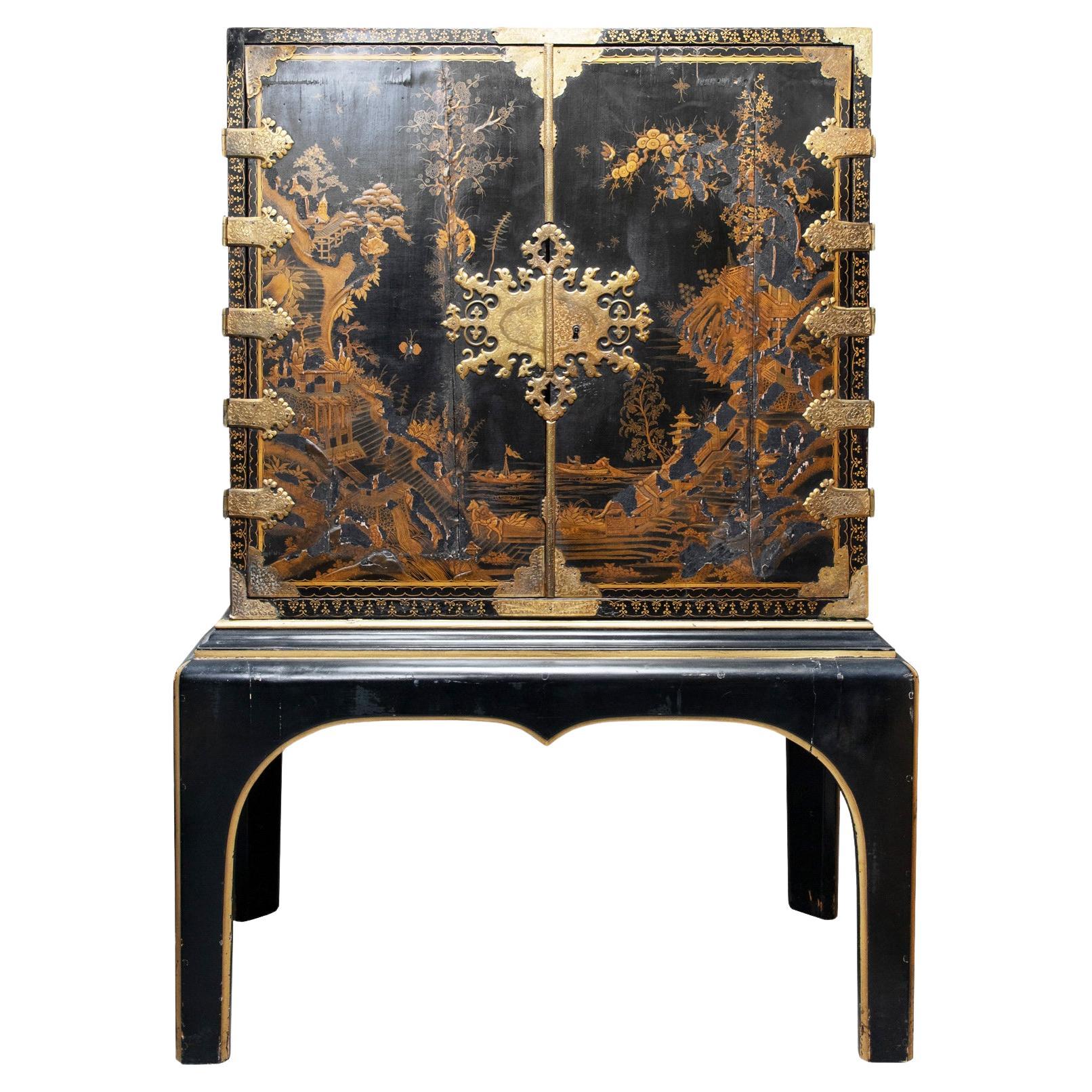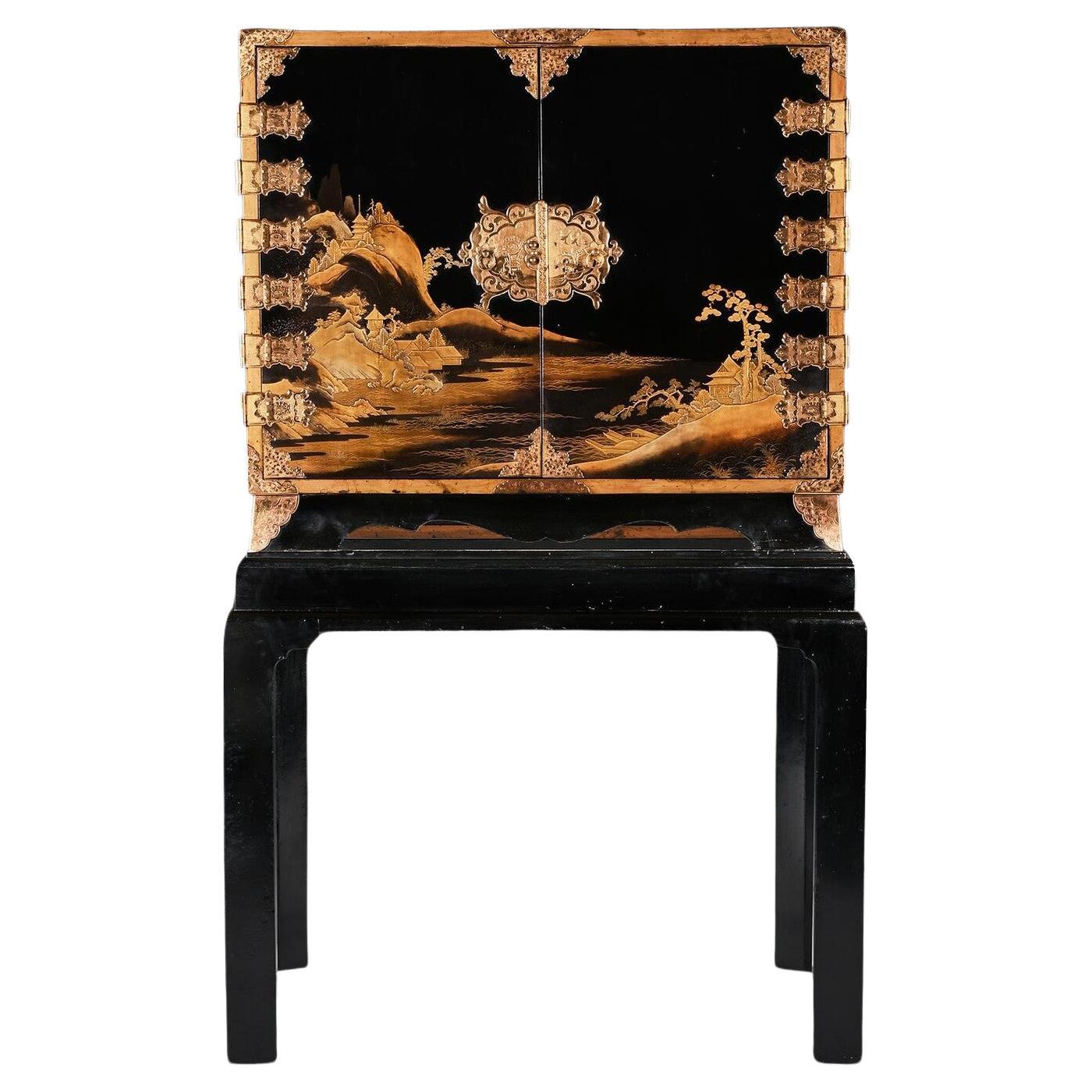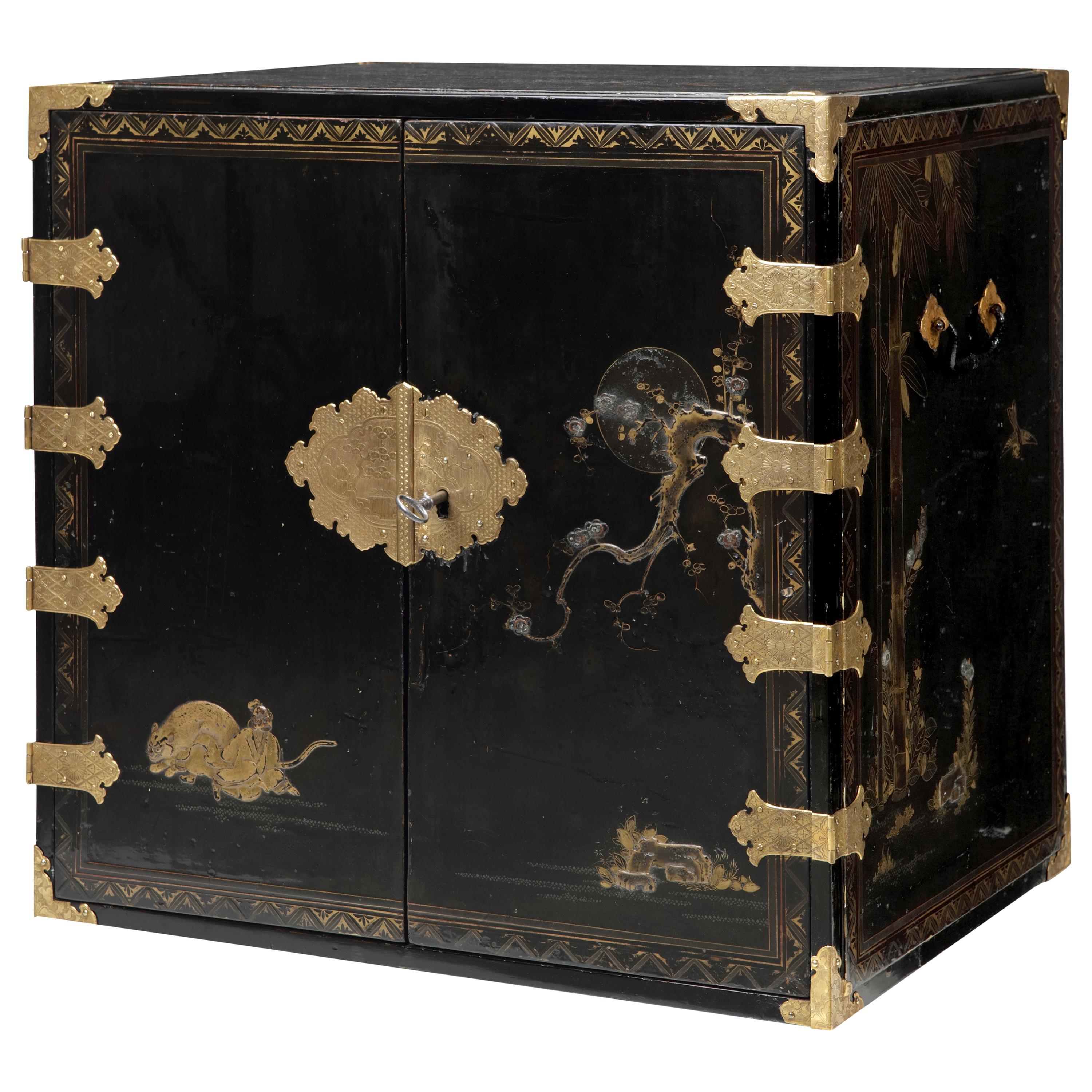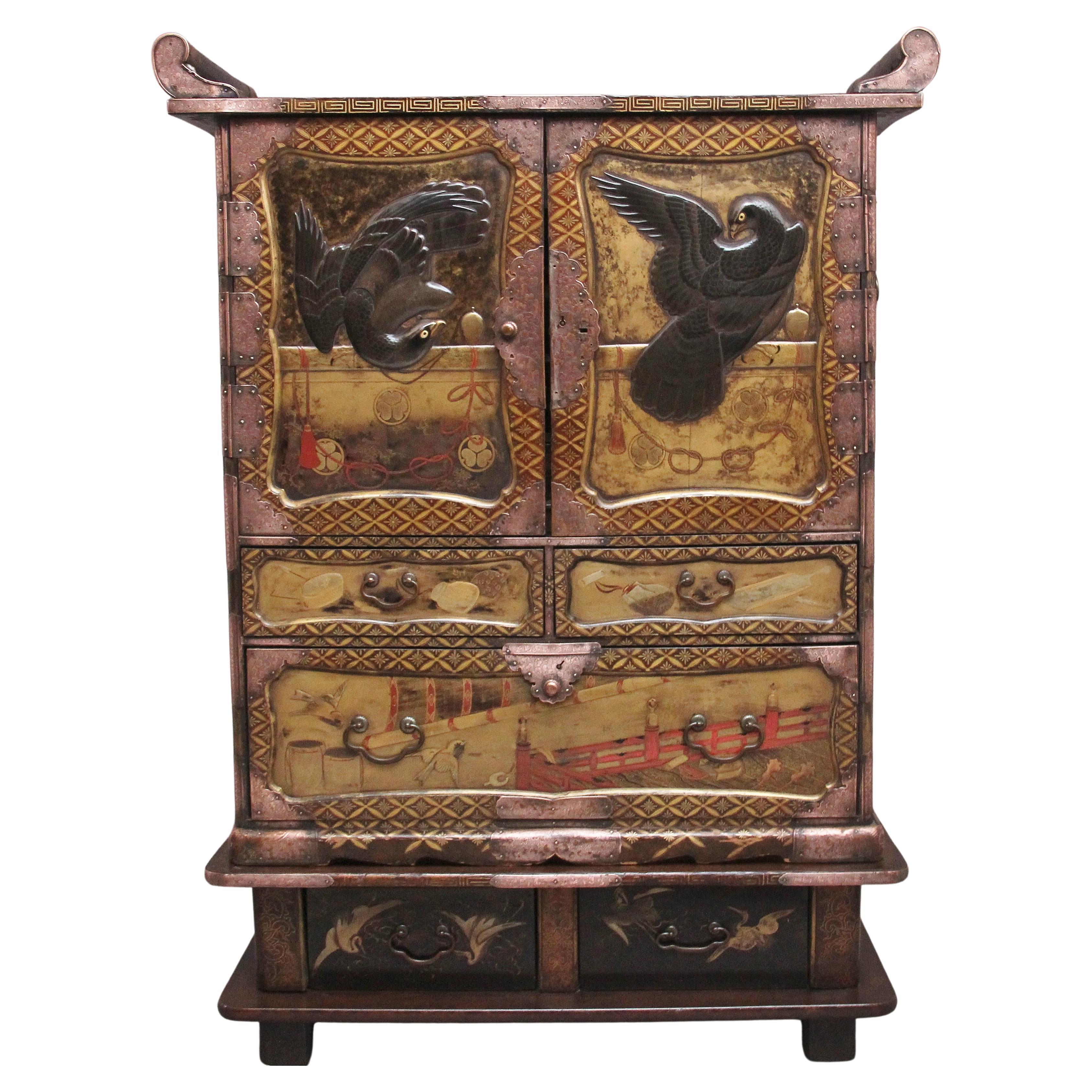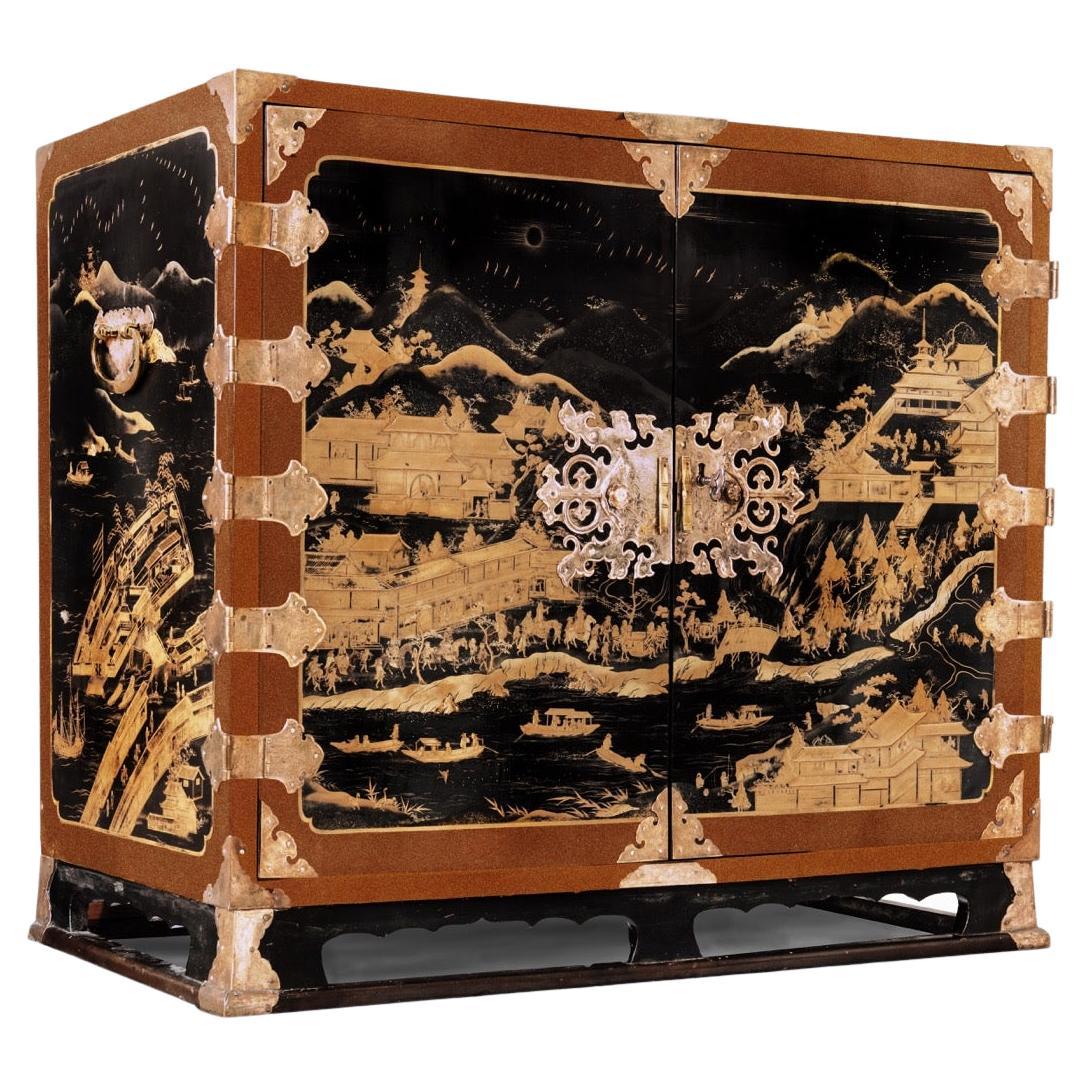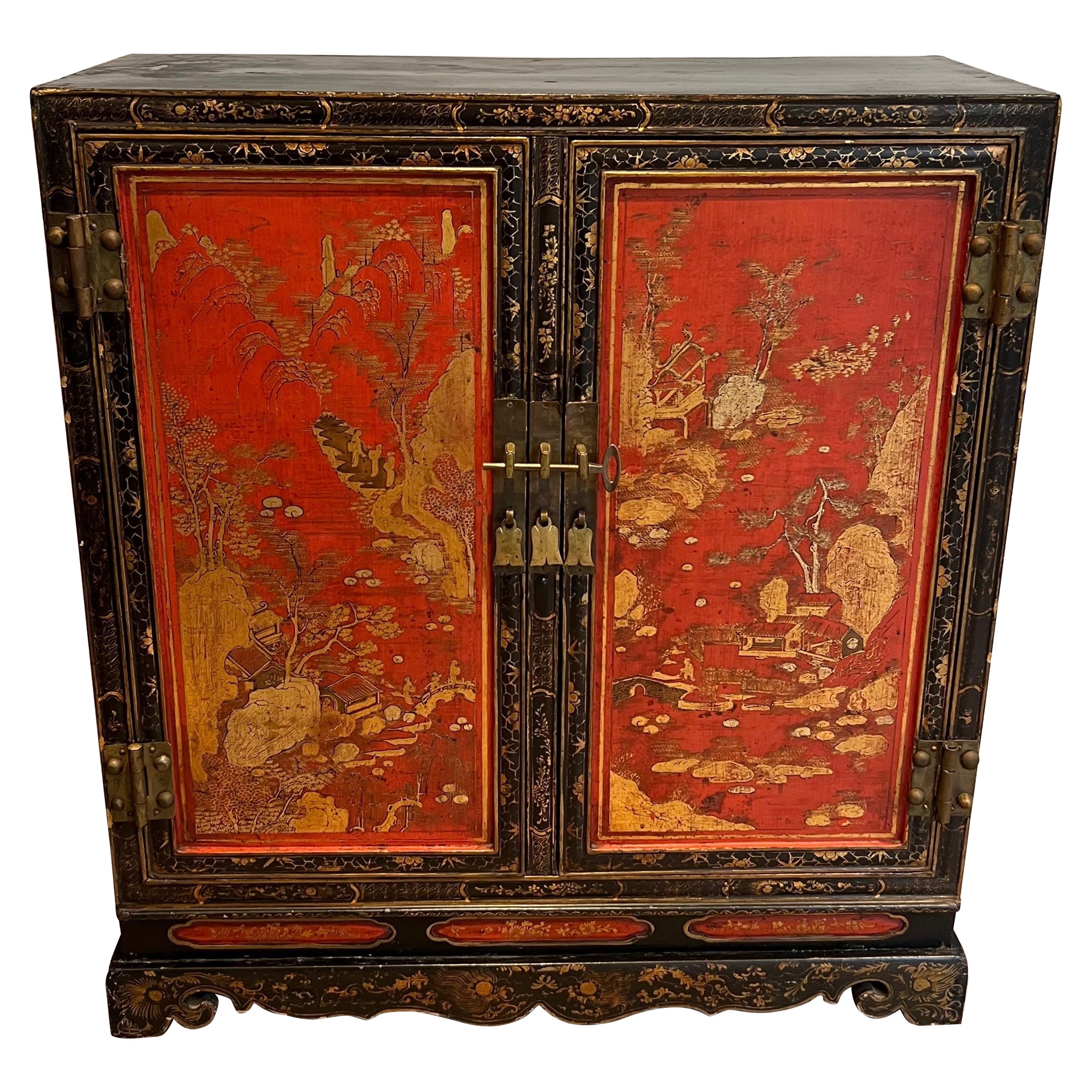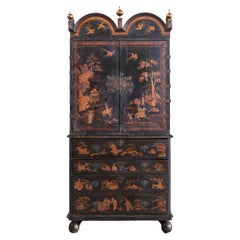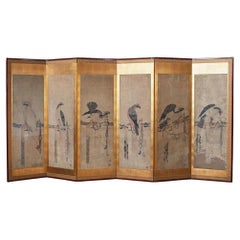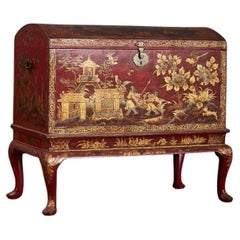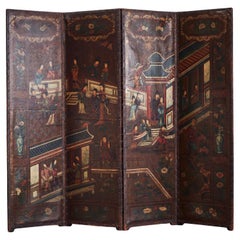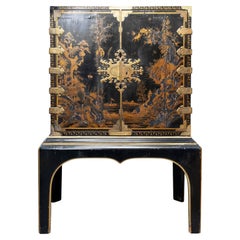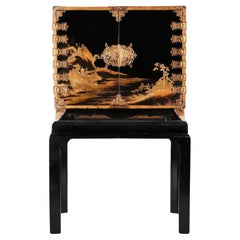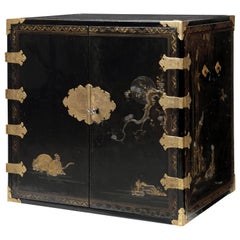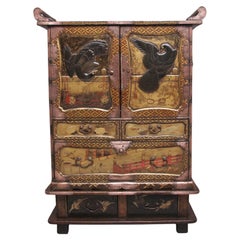Items Similar to A Mid Eighteenth Century Japanese Lacquer Cabinet
Want more images or videos?
Request additional images or videos from the seller
1 of 7
A Mid Eighteenth Century Japanese Lacquer Cabinet
$32,710.13
£24,000
€28,141.41
CA$45,126.47
A$50,182.51
CHF 26,356.94
MX$613,531.52
NOK 328,432.74
SEK 309,623.37
DKK 210,025.86
About the Item
Using Japanese “Urushi” lacquer in a beautifully untouched and sleepy condition, on later stand, This Japanese lacquer cabinet on the stand has a “Nashi-ji decoration (meaning means ” Pear skin pattern”, as the texture resembles the Japanese pear), commonly used for furniture and objects in Japan and East Asia for the past 1200 years; “Nashi-ji” is used for various metal powders, such as gold, silver, platinum, tin, brass, and blue gold / Ao-kin ( Gold and silver alloy powder ). In Japan’s late Edo period ( 1750 – 1867 ), the Tokugawa shogunate frequently announced the sumptuary law and tin or silver powder was mainly used for “Nashi-ji” decorations during this regulatory period.
- Dimensions:Height: 54.53 in (138.5 cm)Width: 39.77 in (101 cm)Depth: 22.05 in (56 cm)
- Style:Edo (Of the Period)
- Materials and Techniques:
- Place of Origin:
- Period:
- Date of Manufacture:Mid 18th Century
- Condition:Wear consistent with age and use.
- Seller Location:London, GB
- Reference Number:1stDibs: LU848141476422
About the Seller
No Reviews Yet
Vetted Professional Seller
Every seller passes strict standards for authenticity and reliability
Established in 2001
1stDibs seller since 2008
35 sales on 1stDibs
Typical response time: 1 to 2 days
- ShippingRetrieving quote...Shipping from: Mitcham, United Kingdom
- Return Policy
Authenticity Guarantee
In the unlikely event there’s an issue with an item’s authenticity, contact us within 1 year for a full refund. DetailsMoney-Back Guarantee
If your item is not as described, is damaged in transit, or does not arrive, contact us within 7 days for a full refund. Details24-Hour Cancellation
You have a 24-hour grace period in which to reconsider your purchase, with no questions asked.Vetted Professional Sellers
Our world-class sellers must adhere to strict standards for service and quality, maintaining the integrity of our listings.Price-Match Guarantee
If you find that a seller listed the same item for a lower price elsewhere, we’ll match it.Trusted Global Delivery
Our best-in-class carrier network provides specialized shipping options worldwide, including custom delivery.More From This Seller
View AllGeorge II Lacquer Cabinet on Chest
Located in London, GB
A George II Lacquer Cabinet on Chest with double dome cornice and three ball finials, above two cabinet doors with robust banded hinges, opening to reveal an interior of ten drawers,...
Category
Antique Mid-18th Century George II Commodes and Chests of Drawers
Materials
Lacquer
A Single Late 19th Century Six Panel Paper Screen, in the manner of Soga Chokuan
Located in London, GB
Six gouache painted scenes of tethered hawks, laid down to form a six panel screen, with pigment and ink on rice paper, surrounded by thickly set gold leaf border, and Japanese silk ...
Category
Antique 19th Century Japanese Edo Paintings and Screens
Materials
Gold Leaf
A George II Red Japanned Coffer on Stand, attributed to Giles Grendey
Located in London, GB
Of perfectly modest form, with a domed lid decorated with dignitaries on their horses, accompanying hounds, long tailed exotic pheasants, butterflies, all set within a landscape with...
Category
Antique Mid-18th Century English George III Blanket Chests
Materials
Wood, Paint
A Late 18th Century Chinoiserie Four Panel Leather Screen
Located in London, GB
Each panel polychrome painted, decorated with Chinoiserie figurative scenes, incorporating interior and exterior settings, within a border of flowers and blue and white vases of flow...
Category
Antique Late 18th Century English Paintings and Screens
Materials
Leather, Paint
Early George III Burr Yew Chest on Chest
Located in London, GB
Having highly unusual diamond shaped veneers, with brushing slide and canted corners on bracket feet
Additional information:
Dimension: Height: 184 cm, 72 1/2″
Width: 101 cm, 39 3/4...
Category
Antique Late 18th Century George III Commodes and Chests of Drawers
Materials
Yew
Regency Campaign Writing Box
Located in London, GB
A Regency Campaign Writing Box of miniature cabinet form, covered with original red Morocco leather, with an extensive selection of drawers, compa...
Category
Antique Early 19th Century Regency Cabinets
Materials
Ormolu
You May Also Like
Early 18th century Japanese Lacquer Cabinet on Stand
Located in Rīga, LV
Rectangular cabinet has nine drawers inside. Hinges, corner mounts and lock plates in gilt brass. Decorated with river landscapes, insects, birds and animals in pairs. The stand is i...
Category
Antique Early 18th Century English George III Cabinets
Materials
Wood, Lacquer
An Important Late 17th Century Japanese Lacquered Cabinet Edo Period on Stand
Located in Benington, Herts
An extremely fine, elegant and rare late 17th Century Japanese lacquer cabinet, from the Eco period, on later lacquered black stand.
Japanese circa 1690
Provenance
A private Scottish collection
This outstanding cabinet is a fascinating fusion of east and west. The cabinet itself would have been made in Japan, c.1690, and is decorated to the outside with hiramaki-e lacquer. This technique involves the use of sprinkled gold powder which adheres to the lacquer surface. On the best pieces, as with this example, many layers are added in order to create areas of high relief and give depth to the surface decoration. The taste of the Japanese workshops in this period was often for quite restrained pieces with plenty of the black background visible, unlike some of the busier Chinese lacquer or European japanned examples produced around the same time. The Japanese makers seemed content to rely on the outstanding quality of the lacquer itself, regarded by most experts as the finest lacquer ever produced, and did not see the need to cover every surface believing that less was more in this respect. The lacquer here is used to produce a mountainous scene with buildings on the bank of a river, the other side of the river with more buildings and a contrasting flatter and forested landscape. The fine perspective achieved is the result of the clever use of raised and flatter areas in the lacquer itself in combination with the drawing of the design itself.
Another remarkable aspect of this piece is the fine metalware throughout, but particularly the lockplate / hasp, hinges and foot mounts to the front. This is all beautifully cast and engraved contrasting against the black background. Interestingly another cabinet on stand with near identical metalwork was advertised in the Burlington Magazine, November 1913, with the dealer W. Williamson and Sons of Guildford. The lacquer on that piece is similarly refined and it seems likely that both pieces came from the same workshop.
The European influence in our piece can be seen in both the later ebonised stand and in the japanned decoration which has been applied to the inside of the doors and is also very fine indeed. This consists of two panels with birds of prey perched on branches in colours set against a golden background. The cabinet has a recent Scottish provenance and so it is likely that the ebonised stand was made in Britain though such pieces were made throughout Europe as a way of quite literally elevating these imported pieces of eastern lacquer as in Japan these would have been used on the floor. Inside the cabinet there is a combination of more Japanese lacquer and lock plates and European drawer handles. Most of the lacquer drawer fronts incorporate mountainous scenes and birds in combination, with a few purely one or the other of the two subjects. Again the lacquer is in excellent condition and is of exceptional quality with multiple layers of relief used in one single scene in many cases.
As mentioned above, Japanese lacquer is the most technically brilliant of the eastern lacquers and, as such, was highly prized by collectors and connoisseurs throughout Europe when this piece was made. The acquisition of such pieces would only have been possible for a small group of incredibly wealthy individuals, largely royal or high ranking courtiers or merchants connected with the East India trade...
Category
Antique 1690s Japanese Edo Cabinets
Materials
Lacquer
Rare Charming 17th Century Japanese Lacquer Cabinet with Gilt-Bronze Mounts
Located in Amsterdam, NL
A fine Japanese pictoral style lacquer cabinet with gilt-metal mounts
Kyoto, Edo period, 1670-1690
Decorated in Japanese relief lacquer work, black lacquer ground decorated...
Category
Antique Late 17th Century Japanese Furniture
Materials
Bronze
$44,459 Sale Price
25% Off
Free Shipping
19th Century Japanese gilt lacquered cabinet
Located in Martlesham, GB
A highly decorative 19th Century Japanese gilt lacquered cabinet from the Meiji period (1868-1912) the double hinged doors decorated with two eag...
Category
Antique 1880s Japanese Meiji Cabinets
Materials
Hardwood
17th Century Japanese Export Lacquer Cabinet with Depiction the Dutch Tradepost
Located in Amsterdam, NL
A highly important Japanese export lacquer cabinet with depiction of the Dutch East India Company tradepost Deshima and the annual Dutch delegation on its way to the Shogun in Edo
Edo period, circa 1660-1680
H. 88 x W. 100.5 x D. 54 cm
This cabinet includes a later European japanned stand, but also a modern powder-coated steel frame.
The latter can be designed and added to your specific needs.
The sides and front of the rectangular two-door cabinet are embellished in gold and silver hiramaki-e and takamaki-e on a black roiro lacquer ground with a continuous design. The two doors depict a long procession of numerous figures travelling on foot and horseback along buildings and a pagoda into a mountainous landscape. This is the annual court journey, Hofreis, of the Dutch from Nagasaki to the Shogun’s court in Edo. Three horseback riders are dressed as Dutch merchants and a fourth figure, probably het Opperhoofd, is seen inside a palanquin, norimon. Just about to cross the bridge, two men are carrying a cabinet like the present one.
Many Japanese figures on either side of the procession are engaged in various activities; some play musical instruments on board of small boats, others are fishing; figures inside buildings are depicted playing go, and farmers are tending to their rice paddocks. The upper part of the right door shows a large mansion, probably the local daimyo’s castle, with men kneeling before a man in the central courtyard.
The court journey fits in with the foreign policy of the shogunate which accorded a role to the VOC alongside China, Korea, and the Ryukyu Islands who also had to pay tribute. However, the VOC employees were traders, having low status in Japan’s social hierarchy, and they were received with less deference than were the state embassies from Korea and the Ryukyu Islands. Nevertheless, the contacts with the Dutch were a welcome source of information to the Shogun about Europe and European science and technology.
The left side of the cabinet depicts, in mirror image, a rare view of the artificial fan-shaped Deshima Island, the trading post for the Dutch in Japan. The island, where the Dutch flag flies, is surrounded by small Japanese boats and an anchored three-masted fluyt (cargo ship), flying Dutch flags, with on the stern the VOC monogram. On the bottom right a busy street of Nagasaki is shown, bordered by shops and leading up to the stone bridge. On the island the trees are beautifully painted, two cows can be seen, and the flagpole, all in very fine detail. Dutchmen and enslaved Malay are visible outside the buildings and two Japanese figures, probably guards, sit in a small hut in the centre.
A maximum of fifteen to twenty Dutchmen lived on the island at any time and soldiers or women were not allowed. Restrictions on Deshima were tight, and the merchants were only allowed to leave the island by special permission. The Opperhoofd had to be replaced every year, and each new Opperhoofd had to make a court journey to pay tribute, present gifts, and to obtain permission to Margaret Barclay eep on trading. In the distance, many birds fly above the hills and a four-story pagoda can be seen. The right side of the cabinet is painted with other horse riders and their retinue journeying through mountains.
The pair of doors to the front open to reveal ten rectangular drawers. The drawers are decorated with scenes of birds in flight and landscapes with trees and plants. The reverse of the left door with two thatched buildings, one with a ladder, underneath a camelia tree with large blooms; the right door with a three-story pagoda nestled among trees and both doors with a flying phoenix, ho-oo bird. The cabinet, with elaborately engraved gilt copper mounts, hinges, lock plates and brass handles, is raised on an 18th-century English japanned wood stand.
A pair of large cabinets...
Category
Antique 17th Century Japanese Edo Lacquer
Materials
Copper, Gold
$1,481,994
Free Shipping
Lacquered Wood Cabinet with Chinese Seenes
Located in Marcq-en-Barœul, Hauts-de-France
This beautiful two doors cabinet is made of black and red lacquered wood presenting Chinese sceens and decorations in gold tones. This is a French work. Circa 1940
Category
Vintage 1940s French Chinese Export Cabinets
Materials
Brass, Bronze
More Ways To Browse
Japanese Mid Century Furniture
Japanese Mid Century
18th Century Lacquer Cabinets
Antique Blue Kitchen Cabinets
Pear Wood Furniture
Japanese Mid Century Cabinets
Antique Japanese Lacquer Cabinet
18th Century Asia Brass
Japanese Metal Cabinet
Japanese Carved Cabinet
Japanned Cabinet On Stand
Edo Period Carved Wood
Japanned Cabinet 18th Century
Antique Storage Tins
Japanese Lacquer Cabinet On Stand
Edo Period Cabinet
Antique Powder Tins
Arch Glass Door
